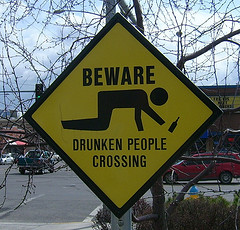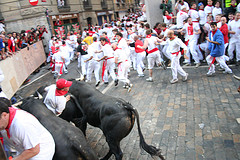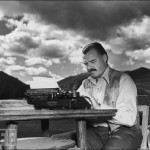
Hemingway Myths
Always do sober what you said you’d do drunk. That will teach you to keep your mouth shut. Ernest Hemingway

MYTH 1 Hemingway cultivated the macho image because he wasn’t really.
Actually he really was all that and more. Macho that is. While we can quibble about what macho means, for the purpose of this post, I’m defining it as what is typically deemed manly, not terribly sensitive, and swaggering. Webster’s defines it as ” characterized by qualities considered manly, especially when manifested in an assertive, self-conscious, or dominating way.”
He was all of that although Hem had tons of sensitivity or he could not have written as he did.

There is no doubt that Hem was brave. In book after book that I’ve read, Hemingway is admired and lauded for true bravery. He was self-sacrificing in Italy as an ambulance driver going back for the wounded when he could have chosen not to. The wounds from Italy stayed with him all of his life.
He was crazy but courageous in Pamplona. That was all in youthful fun. It was more serious in the Spanish Civil War. While a journalist in Spain, during the civil war, his steadfast nerves during bombings and his intent focus on getting the story out in as true a form as possible, and helping others who were in jeoparday, are all legendary. (Martha Gellhorn by the way was equally brave. She was in the thick of it and a stalwart. Hem loved that about her and their love truly blossomed while in Spain and in the midst of war. Both behaved very admirably.)

While living in Key West and then Cuba, Hem ran the “Crook Factory” and trolled the Carribean with his cronies for German subs and bombs. They could have been blown up themselves. While perhaps Hemingway was a bit of a boy looking for adventure, he was not a coward. He liked his comforts but was ok roughing it too. When in China with Martha on a trip he had not wanted to take, Martha hated the dirt, the rustic accomodations, but that did not bother Hem at all. He was happiest talking to the locals at a pub, or in a simple home. He was no snob. Usually by the time Martha got home, an entourage was assembled and drinking, much to her distress. And then there were the plane crashes. More on that in another post.
Still he was real, strong, and brave. No phoney there although he could exaggerate. Other myths will be discussed although not necessarily next week. I’ll surprise you. Write to me please about your favorite myths. Also many of you out there know more than I do so chime in if I’ve got it wrong or if you think he was a phony. I’m interested.


Good topic choice! I opine that any questioning of Hemingway’s courage is less a myth, and more of an attempted slur. As you stated, in war he has been praised by many sources as enormously brave in the physically sense, and would add that his actions of WWII with Col. Lanham 22nd Inf. and other exploits as example. I am currently reading the recently released Vol. 5 of Hemingway’s Letters (Penn State Univ./Cambridge Press) and was struck with his description of hunting big horn rams in Wyoming in 1932, when he stalked 7 different sheep without ever taking a shot – a couple occasions when he mentioned finding himself on a mountain side unable to move forward or backward, and the fear which had to be overcome – the reward for Hemingway, I believe, was the thrill.
Your mention of Hem accompanying Martha Gellhorn to China is on target, showing that Hemingway had not only physical courage, but the courage of moral character – which is likely rarer in the human condition. Serious disease during the China trip was prevalent; for a description anyone may read Gellhorn’s Travels with Myself and Another – which I admire as her finest writing (and quite amusing) Another example of Hemingway’s courageous character was when his 4th wife Mary nearly died in a Casper. Wyoming hospital with an ectopic pregnancy. The doctor had given up saying she was too weak for the operation, and Hemingway took over, administering plasma and improving her condition for the operation – which was successful. A quoted from The Hemingway Women (Bernice Kert / WW Norton&Co) “No one who witnessed the crisis had anything but tremendous respect for Ernest’s quick action. The anesthetist, the doctors, and Mary herself knew that he had saved her life.”
“Grace under pressure” is my comment . . . .
Dear Tim: Terrific points! There is plenty of room to discuss Hemingway’s shortcomings but his courage was not one of them. He was humble and heroic in saving Mary when they gave up on her. The surgeon and staff knew it and Mary did too. And when the planes crashed, he worried about the pilot and refused aid and toughed much out when he should have gotten treatment immediately. He lived with great pain and angst from 1954 on. Thanks for writing, Tim. Wonderful comments and I greatly appreciated it. Best, Christine